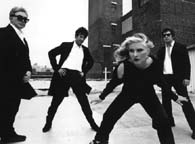
Huddled around a low, narrow coffee table in a Chelsea rehearsal studio, four members of Blondie are discussing their first album in nearly two decades. “One of the reasons it’s called No Exit,” says drummer Clem Burke, “is because there’s a play – by Jean-Paul Sartre? That’s basically what it’s like to be in a band.”
Hell is … other musicians?
“Yeah, exactly. Same as any group of people you’re gonna be involved with.”
Slouched improbably deep into a lumpy sofa, guitarist Chris Stein adds, “And the image of being trapped in a situation, but the door is open.”
“I don’t think the door is open in the play,” Burke replies. “I really don’t.”
Keyboardist Jimmy Destri gets off the couch and stretches supine on the concrete floor. “Isn’t it open throughout the play?” he asks wearily.
“It’s not open,” snaps Burke.
“They never try the door!” moans Stein. “That’s the idea!”
“They try it,” insists Burke.
Perched with one leg tucked under her on a folding plastic chair is Deborah Harry, the lead singer and Stein’s ex-girlfriend. The windowless studio is chilly enough that she’s wearing a coat; in lieu of comment, she wraps her hands more snugly around the paper cup of soup she’s clutching. If her bandmates would let her get a word in, Harry might tell them that they’re both right, sort of: Garcin and his fellow lost souls find the door to their own windowless pit locked at one point, open at another. But why bother? Like the endless conversational torment of Sartre’s play, the old bandmates’ bickering could never be brought to a pat resolution. Who wrote the melody to the new CD’s jazzy “Boom Boom in the Zoom Zoom Room” – Harry or Burke? Is raising kids vegan a form of child abuse? Yuppies in TriBeCa: good or bad? Legitimate questions, all worthy of – and receiving – passionate debate.
Unlike Sartre’s characters, Harry, Stein & co. actually escaped one another’s company seventeen years ago, though not entirely voluntarily. Having got their start on the same mid-seventies CBGB-Max’s Kansas City circuit as the Ramones and Talking Heads, Blondie achieved that rarest of music-world balances, credibility and commercial success. Harry was an original – girl-group sweet and East Village tough. Between 1978 and 1982, Blondie’s blend of punk, pop, and New Wave landed them four No. 1 singles.
But enough mishaps and infighting to fill a season’s worth of Behind the Music episodes ended the band. “By the time we got to The Hunter,” says ex-bassist Nigel Harrison, referring to their sixth album, which tanked, “it was one big nervous breakdown.” Shortly after the group disbanded, a more serious problem arose: Stein’s entire body broke out in sores as he grew thinner and thinner. What first appeared to be aids turned out to be pemphigus, a rare hereditary disease triggered by stress.
Lately, band members have attributed their breakup to the disease – which eventually went into remission, as did Stein’s relationship with Harry. In reality, Stein now concedes, things happened the other way around: The pemphigus was set off by “the band breaking up, and all the bad business deals, and spending five years straight on the road, and doing lots of drugs. I burned myself out.” Stein married briefly; Harry stayed single, pursued a solo career, and has acted in a few films. Living comfortably if not lavishly off the still-healthy sales of Blondie’s back catalogue, Burke, Destri, and Stein worked as session musicians and producers. Harrison spent eight years as an A&R executive at Interscope. All but Burke (who lives in L.A.) have stayed in New York.
The band began considering a reunion three years ago (“We have this legacy we can cash in on,” Harry has remarked. “We’d be stupid if we didn’t”). After rehearsals and a recording session involving Harrison, disagreements arose over new material – leading to the pared-down lineup heard on No Exit. Harrison and guitarist Frank Infante say they were left out unfairly. Stein disagrees: “Nigel didn’t really want to do it. I don’t think that’s anything too litigious to say.” Maybe not. But the two ousted musicians have filed suit over the reunion’s legitimacy – and the profits involved.
“Maria,” the first single, is getting decent airplay, but the album sounds as though time had stopped in 1982, when the band was on creative autopilot. It’s eclectic in the way all Blondie albums have been: There’s the reggae song, the disco-ish number, the charmingly mushy ballad. The title track even re-creates Blondie’s most singular hit: Like “Rapture,” “No Exit” features a rap showdown between Harry and a guest rhymer, this time Coolio.
No Exit hits stores February 23, the day the band plays an invitation-only concert at Town Hall. A brief warm-up tour in Europe was a sellout, and “Maria” debuted at No. 1 in England. “The shows have been great,” says Burke. “I think we’re communicating better than ever onstage. What do you guys think?” The room is silent. Destri, still on his back, covers his eyes with his forearm. “The interview environment is a little less than ideal sometimes,” Burke notes.
The muffled but insistent roar of another band down the hall fills the room. “These guys are really good, this band,” Burke says.
Harry glances up: “It sounds like a tape!”
“I know,” replies Burke. “It’s good.”
Stein chimes in: “I don’t know. I don’t think it’s a tape.”
“I think that’s what it is,” says Harry, putting her soup down. “There’s not enough movement.”
“Not enough low-end, rock-the-room stuff,” adds Burke.
“That’s ‘cause the fuckin’ door’s closed!” erupts Stein.
The music grows louder. “This sounds live now,” says Harry.
“Yeah,” Burke agrees. “It was a tape before.”
“Nonsense!” says Stein. “You guys are so dense, I can’t believe it! They have the door open now!”
Not that anybody’s going anywhere.